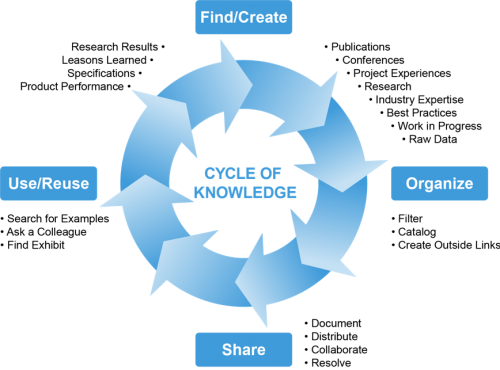The cycle of knowledge from creation and organization through sharing and reuse is well documented in the literature.
Figure 3.1 The Cycle of Knowledge from Creation and Organization through Sharing and Reuse

The cycle of knowledge from creation and organization through sharing and reuse is well documented in the literature.

Knowledge management refers to activities related to:
The table below includes examples of the subcategories within knowledge management, along with the associated activities and capabilities that are built through this strategy.
| Strategy subcategory | Sample Activities | Capabilities Addressed |
|---|---|---|
| Social and Learning Communities | Facilitating Communities of Practice that meet periodically to share experiences and brainstorm about solutions to common problems | Aligning Skills to Needs Attracting and Retaining Workforce Agility & Resilience Technology Adoption Operations Focus |
| Knowledge Capture and Transfer | Creating a curated, validated lessons learned database | Aligning Skills to Needs Agility & Resilience Technology Adoption Operations Focus |
| Knowledge Audits | Conducting an employee survey to discover and catalog where certain types of expertise exist in the agency | Aligning Skills to Needs Agility & Resilience Technology Adoption Operations Focus |
| Learning Organization | Leadership training to model behaviors conducive to learning and innovation | Aligning Skills to Needs Attracting and Retaining Workforce Agility & Resilience Technology Adoption Operations Focus |
| Mentoring | Matching up less experienced employees with more senior employees to meet periodically and discuss challenges | Aligning Skills to Needs Attracting and Retaining Workforce Agility & Resilience Technology Adoption Operations Focus |
| Expertise Directories | Creating a directory of employees with expertise in certain specialized areas | Aligning Skills to Needs Agility & Resilience Technology Adoption Operations Focus |
Washington DOT (WSDOT) has established a knowledge management approach for addressing:
NCHRP Scan 12-04 Advances in Transportation Agency Knowledge Management: http://onlinepubs.trb.org/onlinepubs/nchrp/docs/nchrp20-68a_12-04.pdf
They have implemented several KM initiatives, including: